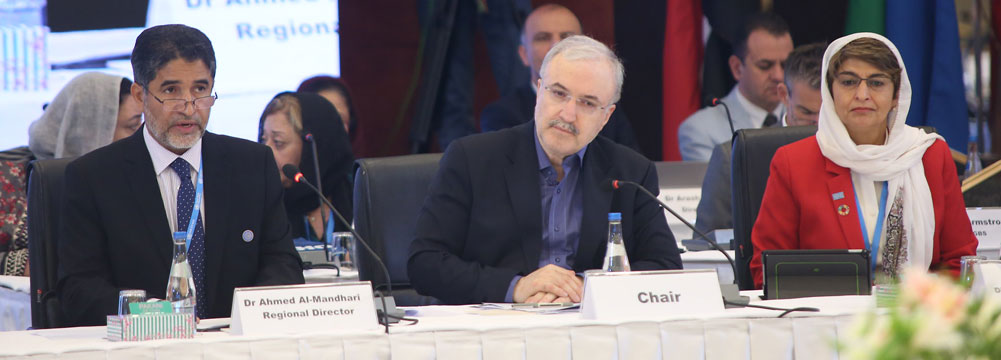
17 October 2019, Tehran, Islamic Republic of Iran -- The WHO Regional Committee concluded its 66th session, held in Tehran, Islamic Republic of Iran, with the endorsement of 6 important resolutions covering critical health issues that Member States had discussed over the past 4 days, and endorsing the WHO Regional Director’s annual report on the work of WHO in the Region in 2018.
At the closing session of the Regional Committee today, members of the Regional Committee adopted the Regional Director’s annual report and thanked the Regional Director for its comprehensiveness. They also endorsed the framework for action on acute rheumatic fever and rheumatic heart disease in the Eastern Mediterranean Region, as well as the strategy on nutrition for the Region, 2020–2030, and urged Member States to implement both the framework and the strategy. The Regional Director was requested to provide the needed technical support to countries in this regard.
To advance universal health coverage in the Region, the Regional Committee urged Member States to develop and implement strategies to strengthen the nursing and midwifery workforce, enhance the work environment for nurses to best utilize their knowledge and skills, expand the role and scope of nursing practice, and reorient nursing and midwifery education and training. The Regional Director was requested to facilitate technical cooperation with Member States to develop national plans and strategies in line with the regional framework for action on strengthening nursing and midwifery.
Another resolution by the Regional Committee urged Member States to use the framework on ending preventable newborn, child and adolescent deaths and improving health and development. Newborns, children and adolescents make up around 40% of the population of the Region. Member States were urged to consider the renewed focus on primary health care and universal health coverage as an opportunity to advance the survival, healthy growth and development agenda for newborns, children and adolescents in the Region and to disseminate their experiences and best practices in this area. The Regional Director was requested to support countries in developing and implementing national newborn, child and adolescent health policies and strategies and to strengthen partnerships with UN agencies, professional associations, civil society and the private sector to support and scale up implementation across the continuum of care.
Acknowledging the global and regional commitments to universal health coverage and the damage and disruption to hospital systems and services resulting from emergencies, the members of the Regional Committee endorsed the framework for action for the hospital sector in the Eastern Mediterranean Region and called on Member States to ensure political commitment to planning and implementing people-centred hospitals to move towards universal health coverage. They requested the Regional Director to facilitate regional and country-specific policy dialogue on reforming the hospital sector and to support countries to ensure that their hospitals are resilient during emergencies.
The members of the Regional Committee also endorsed the framework for improving national institutional capacity for evidence-informed policy-making for health in the Region and urged Member States to foster evidence-informed policy-making and establish national mechanisms for systematic use of evidence in making national health policies. The Regional Director was requested to develop an action plan for implementation of the framework in consultation with Member States and to support Member States to strengthen their institutional capacities in the use of evidence in policy-making for health.
An updated regional framework for action to implement the United Nations Political Declaration on Noncommunicable Diseases, including indicators to assess country progress by 2030, was endorsed by the Regional Committee, and Member States were urged to implement the strategic interventions identified in the regional framework. The Regional Director was requested to assist Member States to accelerate implementation of their national noncommunicable action plans and monitor progress towards their targets.
In a resolution on the regional framework for action to strengthen the public health response to substance use, members of the Regional Committee endorsed the framework and urged Member States to implement the strategic interventions identified in it. They requested the Regional Director to support Member States to enhance their capacity to undertake and utilize operational research and generate reliable and comparable data, and to facilitate the development of regional networks for regular exchange of information and good practices in this area.
The 67th session of the Regional Committee will be held at the WHO Regional Office for the Eastern Mediterranean in Cairo, Egypt.


